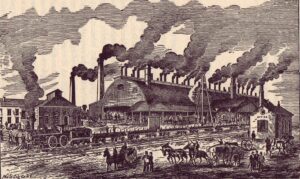On a recent trip to Charlotte, North Carolina, I had the opportunity to take in the city’s art and restaurant scene, which I would HIGHLY recommend to anyone for a weekend. More than just giving me loads of inspiration, the visit called me to reflect/question how a city’s identity is constructed. Does the run of the mill Jane Smith typically reflect more on the history of a city or the trends of the present before she visits? And what draws people to each city? What makes them move there? What makes them stay? What drives them away? Me? I like low taxes and a great art scene. I like walkability and commerce. Others like quiet and quaint, picturesque views and still more love the hustle and bustle of of big city life. As I focused my lens on Charlotte, I tried to think how my own city projects itself to the world.
 Atlanta has a rich history, long before rising from the ashes of the Civil War. My city, named Terminus, for its rail identity was one that sprang up from necessity of business, trade, and transportation. Long before she ever became the Gateway to the South, Atlanta was buzzing with people moving to and fro, selling their wares and has always had a more transient population as a result. Locals here know there are few true “native” Atlantans, as most Georgians coming from small towns move here to either try their hand at making it “big” in the “big city” or to escape the narrowness of living in a small town straight out of Faulkner. My story was similar: farm girl grows up in Social Circle. Studies hard in small town and attends the women’s’ college (Agnes Scott College) in small town close to bigger city.
Atlanta has a rich history, long before rising from the ashes of the Civil War. My city, named Terminus, for its rail identity was one that sprang up from necessity of business, trade, and transportation. Long before she ever became the Gateway to the South, Atlanta was buzzing with people moving to and fro, selling their wares and has always had a more transient population as a result. Locals here know there are few true “native” Atlantans, as most Georgians coming from small towns move here to either try their hand at making it “big” in the “big city” or to escape the narrowness of living in a small town straight out of Faulkner. My story was similar: farm girl grows up in Social Circle. Studies hard in small town and attends the women’s’ college (Agnes Scott College) in small town close to bigger city.
I always like to ask people I meet why they moved here. I know why I did, but I assume different strokes for different folks. The resounding answer I tend to get is for “jobs” and the opportunity for upward mobility. Is this legacy of a business oriented city still true? Are we really a city that allows outsiders to come in and pull themselves up by the bootstraps to “make it”? If so, how are we continuing to foster that image and promote growing business?
Atlanta has done a great job of promoting itself as a city “too busy to hate” and a place whose Mayor tries to be responsive to his business community. Most recently, Mayor Reed had his Bobby Kennedy moment in the spot light as he tried to calm the #BlackLivesMatter movement protests in the streets. In many ways, he navigated the storm well, with respect for the protestors and the blue line. The moment Reed welcomed peaceful protests in the streets of Atlanta while asking them to stay out of the expressway was a moment I was truly proud of him! I wish more people in the nation had the opportunity to see that side of our city. In a city with a black mayor, a black city council, county commission and school board, we know from the bottom to the top that #blacklivesmatter here.
Mountaintop moments did not end in Atlanta with MLK, Jr. Continue reading “ATL Identity: Business, Trade, and Transportation”